
FACULTY OF ENGINEERING
Department of Genetics and Bioengineering
FE 350 | Course Introduction and Application Information
| Course Name |
Fermentation Technology
|
|
Code
|
Semester
|
Theory
(hour/week) |
Application/Lab
(hour/week) |
Local Credits
|
ECTS
|
|
FE 350
|
Fall/Spring
|
3
|
0
|
3
|
5
|
| Prerequisites |
|
|||||||||
| Course Language |
English
|
|||||||||
| Course Type |
Elective
|
|||||||||
| Course Level |
First Cycle
|
|||||||||
| Mode of Delivery | - | |||||||||
| Teaching Methods and Techniques of the Course | - | |||||||||
| Course Coordinator | ||||||||||
| Course Lecturer(s) | - | |||||||||
| Assistant(s) | - | |||||||||
| Course Objectives | The purpose of this course is to provide students with the necessary fundamental knowledge related to the scientific principles of fermentation, the production methods of important industrial fermentation products, parameters affecting production quality and skills of solving engineering problems. |
| Learning Outcomes |
The students who succeeded in this course;
|
| Course Description | This course will cover; Introduction to fermentation and fermentation processes; the microorganisms involved in the food industry; bioprocess techniques and principles; batch, fed-batch, continouous productions; cheese production; meat, table olive, bread fermentations, lactic acid fermentation and pickle production, wine and beer fermentations and production principles, technological steps during industrial productions; engineering applications and problem solving techniques |
|
|
Core Courses | |
| Major Area Courses | ||
| Supportive Courses | ||
| Media and Management Skills Courses | ||
| Transferable Skill Courses |
WEEKLY SUBJECTS AND RELATED PREPARATION STUDIES
| Week | Subjects | Related Preparation |
| 1 | Introduction to fermentation technology | Pascale Cossart, 2020, THE New Microbiology From Microbiomes to CRISPR. ASM Press, Washington, DC, USA. ISBN 9781683670100 Chapter 1, 17 |
| 2 | Industrial microorganisms and their growth media components | Pascale Cossart, 2020, THE New Microbiology From Microbiomes to CRISPR. ASM Press, Washington, DC, USA. ISBN 9781683670100 Chapter 17 |
| 3 | Microbial growth | Pascale Cossart, 2020, THE New Microbiology From Microbiomes to CRISPR. ASM Press, Washington, DC, USA. ISBN 9781683670100 Chapter 17 |
| 4 | Anaerobic respiration and fermentation mechanisms | Waites, M. J., Morgan, N. L., Rockey, J. S., Higton, G., 2001, Industrial Microbiology. An Introduction. Blackwell Sci. Ltd., UK. Chapter 6 |
| 5 | Choosing the cultivation method | Shuler, M.L., Kargi F., DeLisa M., 2002, Bioprocess Engineering: Basic Concepts, Prentice Hall International, USA. Chapter 9 |
| 6 | Batch and continuous bioreactors | Shuler, M.L., Kargi F., DeLisa M., 2002, Bioprocess Engineering: Basic Concepts, Prentice Hall International, USA. Chapter 9 |
| 7 | Immobilized cell systems | Shuler, M.L., Kargi F., DeLisa M., 2002, Bioprocess Engineering: Basic Concepts, Prentice Hall International, USA. Chapter 9 |
| 8 | Operating Considerations for Bioreactors | Shuler, M.L., Kargi F., DeLisa M., 2002, Bioprocess Engineering: Basic Concepts, Prentice Hall International, USA. Chapter 9 |
| 9 | Operating Considerations for Bioreactors | Shuler, M.L., Kargi F., DeLisa M., 2002, Bioprocess Engineering: Basic Concepts, Prentice Hall International, USA. Chapter 9 |
| 10 | Wine fermentation | Hutkins, Robert W., 2006, Microbiology and Technology of Fermented Foods, Wiley-Blackwell, USA. Chapter 10 |
| 11 | Beer fermentation | Hutkins, Robert W., 2006, Microbiology and Technology of Fermented Foods, Wiley-Blackwell, USA. Chapter 9 |
| 12 | Producion of various industrial fermentation products | Pascale Cossart, 2020, THE New Microbiology From Microbiomes to CRISPR. ASM Press, Washington, DC, USA. ISBN 9781683670100 Chapter 19 |
| 13 | Project presentations | |
| 14 | Project presentations | |
| 15 | Review of the semester | |
| 16 | Final exam |
| Course Notes/Textbooks | Pascale Cossart, 2020, THE New Microbiology From Microbiomes to CRISPR. ASM Press, Washington, DC, USA. ISBN 9781683670100 |
| Suggested Readings/Materials | Hutkins, Robert W., 2006, Microbiology and Technology of Fermented Foods, Wiley-Blackwell, USA. Shuler, M.L., Kargi F., DeLisa M., 2002, Bioprocess Engineering: Basic Concepts, Prentice Hall International, USA. Waites, M. J., Morgan, N. L., Rockey, J. S., Higton, G., 2001, Industrial Microbiology. An Introduction. Blackwell Sci. Ltd., UK. Stanburry, P. F., Whitaker,A., Hall, S. J., 1995, Priciples of Fermentation Technology. Third Edition. Butterworth-Heinemann Sci. Ltd., UK, USA. Print ISBN : 9781555815127. |
EVALUATION SYSTEM
| Semester Activities | Number | Weigthing |
| Participation | ||
| Laboratory / Application | ||
| Field Work | ||
| Quizzes / Studio Critiques | ||
| Portfolio | ||
| Homework / Assignments |
1
|
10
|
| Presentation / Jury |
1
|
30
|
| Project | ||
| Seminar / Workshop | ||
| Oral Exams | ||
| Midterm |
1
|
20
|
| Final Exam |
1
|
40
|
| Total |
| Weighting of Semester Activities on the Final Grade |
3
|
60
|
| Weighting of End-of-Semester Activities on the Final Grade |
1
|
40
|
| Total |
ECTS / WORKLOAD TABLE
| Semester Activities | Number | Duration (Hours) | Workload |
|---|---|---|---|
| Theoretical Course Hours (Including exam week: 16 x total hours) |
16
|
3
|
48
|
| Laboratory / Application Hours (Including exam week: '.16.' x total hours) |
16
|
0
|
|
| Study Hours Out of Class |
14
|
2
|
28
|
| Field Work |
0
|
||
| Quizzes / Studio Critiques |
0
|
||
| Portfolio |
0
|
||
| Homework / Assignments |
1
|
10
|
10
|
| Presentation / Jury |
1
|
20
|
20
|
| Project |
0
|
||
| Seminar / Workshop |
0
|
||
| Oral Exam |
0
|
||
| Midterms |
1
|
14
|
14
|
| Final Exam |
1
|
30
|
30
|
| Total |
150
|
COURSE LEARNING OUTCOMES AND PROGRAM QUALIFICATIONS RELATIONSHIP
|
#
|
Program Competencies/Outcomes |
* Contribution Level
|
||||
|
1
|
2
|
3
|
4
|
5
|
||
| 1 | To have adequate knowledge in Mathematics, Science and Genetics and Bioengineering; to be able to use theoretical and applied information in these areas on complex engineering problems. |
|||||
| 2 | To be able to identify, define, formulate, and solve complex Genetics and Bioengineering problems; to be able to select and apply proper analysis and modeling methods for this purpose. |
|||||
| 3 | To be able to design a complex system, process, device or product under realistic constraints and conditions, in such a way as to meet the requirements; to be able to apply modern design methods for this purpose. |
|||||
| 4 | To be able to devise, select, and use modern techniques and tools needed for analysis and solution of complex problems in Genetics and Bioengineering applications; to be able to use information technologies effectively. |
|||||
| 5 | To be able to design and conduct experiments, gather data, analyze and interpret results for investigating complex engineering problems or Genetics and Bioengineering research topics. |
|||||
| 6 | To be able to work efficiently in Genetics and Bioengineering disciplinary and multi-disciplinary teams; to be able to work individually. |
|||||
| 7 | To be able to communicate effectively in Turkish, both orally and in writing; to be able to author and comprehend written reports, to be able to prepare design and implementation reports, to present effectively, to be able to give and receive clear and comprehensible instructions. |
|||||
| 8 | To have knowledge about global and social impact of Genetics and Bioengineering practices on health, environment, and safety; to have knowledge about contemporary issues as they pertain to engineering; to be aware of the legal ramifications of Genetics and Bioengineering solutions. |
|||||
| 9 | To be aware of ethical behavior, professional and ethical responsibility; to have knowledge about standards utilized in Genetics and Bioengineering applications. |
|||||
| 10 | To have knowledge about industrial practices such as project management, risk management, and change management; to have awareness of entrepreneurship and innovation; to have knowledge about sustainable development. |
|||||
| 11 | To be able to collect data in the area of Genetics and Bioengineering, and to be able to communicate with colleagues in a foreign language. |
|||||
| 12 | To be able to speak a second foreign language at a medium level of fluency efficiently. |
|||||
| 13 | To recognize the need for lifelong learning; to be able to access information, to be able to stay current with developments in science and technology; to be able to relate the knowledge accumulated throughout the human history to Genetics and Bioengineering. |
|||||
*1 Lowest, 2 Low, 3 Average, 4 High, 5 Highest
NEWS |ALL NEWS
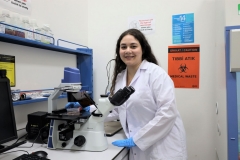
Germany chose Ezgi
Ezgi Kaya, who graduated from Izmir University of Economics (IUE) Department of Genetics and Bioengineering this year, was accepted to the world-famous
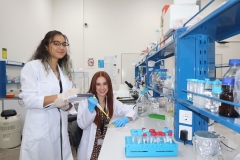
Geneticists’ success in ‘Germany’
Nine newly graduated students from Izmir University of Economics (IUE) Department of Genetics and Bioengineering achieved great success by being accepted to
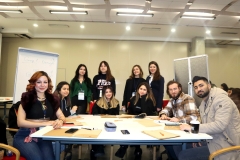
'Sustainable energy' ideas from students
Izmir University of Economics (IUE) organized a workshop on biohydrogen, which is used in many fields from industry to transportation and stands
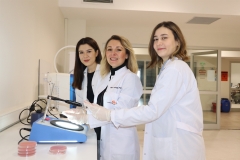
Discovery in thermal spring
Asst. Prof. Dr. Mine Güngörmüşler from Izmir University of Economics (IUE), Department of Genetics and Bioengineering, and two graduate students examined the
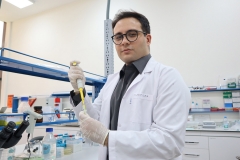
Arda ranked among 7 people in the world
Arda Kıpçak, who graduated from Department of Genetics and Bioengineering, Izmir University of Economics (IUE) this year, was accepted to the world-renowned
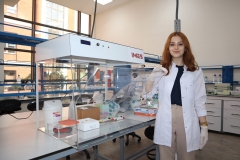
'Smart cabinet' against the virus
Assoc. Prof. Dr. Osman Doluca and his 4 students from Izmir University of Economics (IUE) developed a 'PCR cabinet' that allows samples
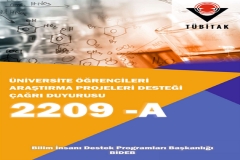
Our Senior Students are Granted Support by TÜBİTAK for Their Graduation Projects
Five of our students are entitled to receive support from TÜBİTAK (The Scientific and Technological Research Council of Turkey) within the scope
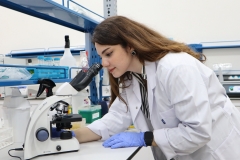
American universities welcome Aydolun with open arms
Aydolun Petenkaya, who completed Izmir University of Economics (IUE) Department of Genetics and Bioengineering as a top student with a full scholarship
